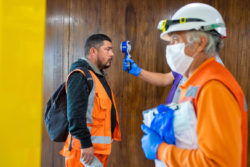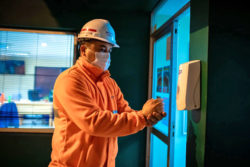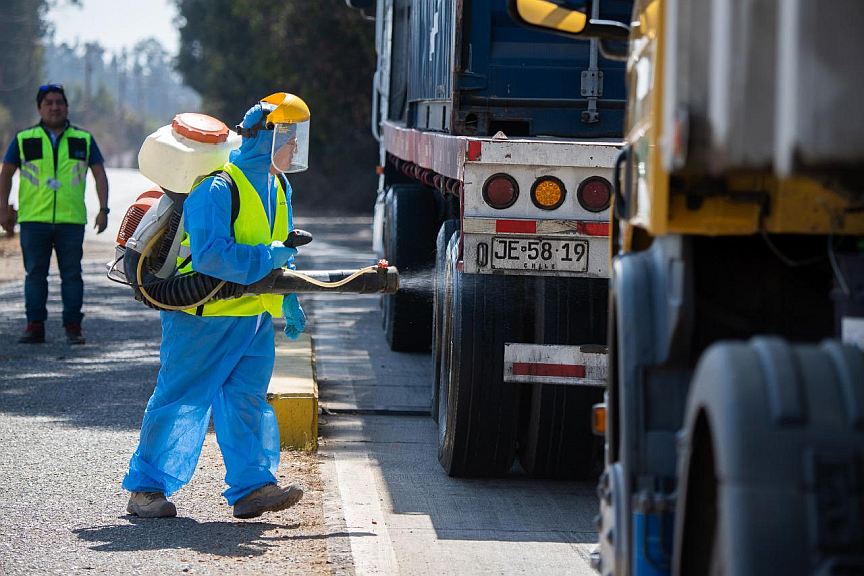Social responsibility is a matter taken very seriously by the Port of San Antonio. In response to Covid-19, and in permanent cooperation with the city council and neighbourhood councils, the port authority has conducted several decontamination actions, and is committed to support in different community facilities: hospitals, rural clinics, food markets, fishermen’s facilities, and even the city’s penitentiary centre.
The Port of San Antonio is an active member of AIVP since 2011
AIVP – How does Covid-19 affect your territory? What are its main consequences on the port’s activities, especially on the logistical and economic aspects?

Carlos Mondaca Matzner, Head of Public Affairs – Puerto San Antonio, Chile – In the first two months of the year, we have seen a decline of the freight traffic, adding to the deterioration we have already experienced in 2019.
According to Customs figures, in the first quarter of this year Chilean foreign trade fell 12% compared to the same period last year. There is no doubt that this situaton is also affecting San Antonio.
AIVP – We reported in one of our recent special Covid-19 newsletters the help given by the port of San Antonio to the city to disinfect some of its hospitals. Can you mention other actions that you have launched to contribute to the fight against the virus?
Carlos Mondaca Matzner, Puerto San Antonio, Chile – In San Antonio, there are around 2,000 port workers and an equivalent number of customs employees, carriers, inspectors and other activities directly related to the traffic of goods in the port area. That is why, in our role as port authority, we took two steps: the first was to develop with our three concessionary terminals (STI, DPWorld San Antonio and Puerto Panul) a prevention plan for their employees. In addition, because of our role in the San Antonio logistics community (COLSA), we are working with the rest of the stakeholders in the supply chain who are not port workers to maintain operations with safety standards that reduce the risk of contagion between them.


Within the port facilities, masks and gloves are systematically provided to all workers who have to work their shift directly on the ships, the number of hydroalcoholic gel supply points in the terminals has been increased, and every machine, equipment and surface that the port worker might come in contact with during his or her shift is disinfected with ammonium. In addition, we check the body temperature of every person who enters or drives a truck into our facilities.
For more than ten days we have been treating all the trucks entering the port, paying particular attention to the products that are handled by our employees.
In addition, we have ensured that crews do not leave their ships and each captain must send us a declaration detailing the state of health of his entire crew.
AIVP – Quarantine has disrupted our ways of interacting and prevents us from planning events, at least in the near future. How do you maintain the link with the citizens and the access to Port City culture?
Carlos Mondaca Matzner, Puerto San Antonio, Chile – It is obvious that the current situation has disrupted the normal course of daily life for all Chileans and, of course, for all the residents of San Antonio. We believe it is time to help, through preventive measures, obviously because it is our responsibility as a port authority, but also because we are located in the immediate vicinity of San Antonio. We believe that this is really essential at this time.
AIVP – We have also highlighted in our special Covid-19 newsletter the campaign the port of San Antonio has launched to promote the flu vaccination. The port authorities can contribute to reduce the social consequences of this difficult period. Can you explain to us the other solidarity actions that you have launched to help the community?
Carlos Mondaca Matzner, Puerto San Antonio, Chile – In addition to decontaminating parts of the Claudio Vicuña Hospital, we also contribute to the treatment of the streets of the city, in coordination with the neighbourhood councils. Recently, we participated in the decontamination of the rural health centres of Malvilla, Aguas Buenas and Leyda. We also carried out a 10-day decontamination operation of the Barrancas family health Center. Lastly, we donated two refrigerators to this health Center for the storage of medical goods, and delivered 250 medical suits to them.
At the same time, we also carried out 3 decontamination operations within the San Antonio Penitentiary Center. In a different field, and in coordination with the fishermen‘s cooperatives, we have made two contributions for the decontamination of the docks located in the creek of Pacheco Altamirano.
This week, in cooperation with the Municipality and some neighbourhood councils, we will conduct an information campaign targeting local market vendors in order to generalize preventive practices. In the coming days, we will also offer them the possibility of decontaminating their personal vehicles if they use them for their professional activities.





